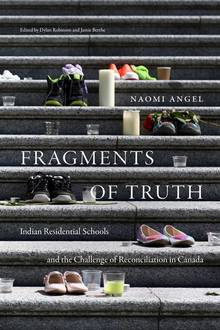Fragments of Truth: Residencial Schools and Challenge of Reconciliations in Canada
Angel, Naomi
Éditeur : UNIVERSITY OF TORONTO PRESS
ISBN papier: 9781478018575
Parution : 2022
Code produit : 1458621
Catégorisation :
Livres /
Sciences humaines /
Sciences sociales /
Études autochtones
Formats disponibles
| Format | Qté. disp. | Prix* | Commander |
|---|---|---|---|
| Livre papier | En rupture de stock** |
Prix membre : 32,25 $ Prix non-membre : 33,95 $ |
*Les prix sont en dollars canadien. Taxes et frais de livraison en sus.
**Ce produits est en rupture de stock mais sera expédié dès qu'ils sera disponible.
Description
In 2008, the Canadian government established a Truth and Reconciliation Commission (TRC) to review the history of the residential school system, a brutal colonial project that killed and injured many Indigenous children and left a legacy of trauma and pain. In Fragments of Truth Naomi Angel analyzes the visual culture of reconciliation and memory in relation to this complex and painful history. In her analyses of archival photographs from the residential school system, representations of the schools in popular media and literature, and testimonies from TRC proceedings, Angel traces how the TRC served as a mechanism through which memory, trauma, and visuality became apparent. She shows how many Indigenous communities were able to use the TRC process as a way to claim agency over their memories of the schools. Bringing to light the ongoing costs of transforming settler states into modern nations, Angel demonstrates how the TRC offers a unique optic through which to survey the long history of colonial oppression of Canada's Indigenous populations























